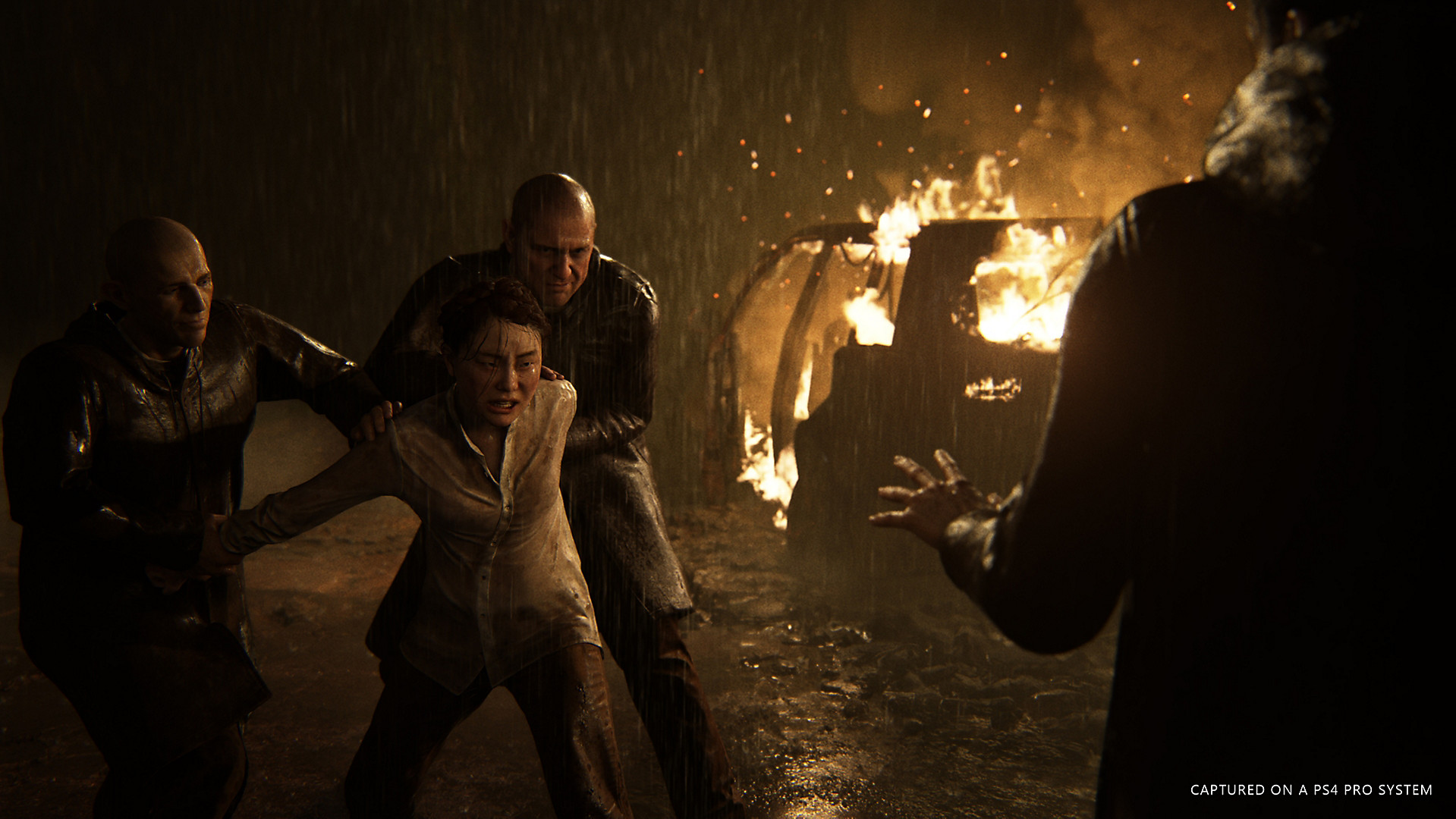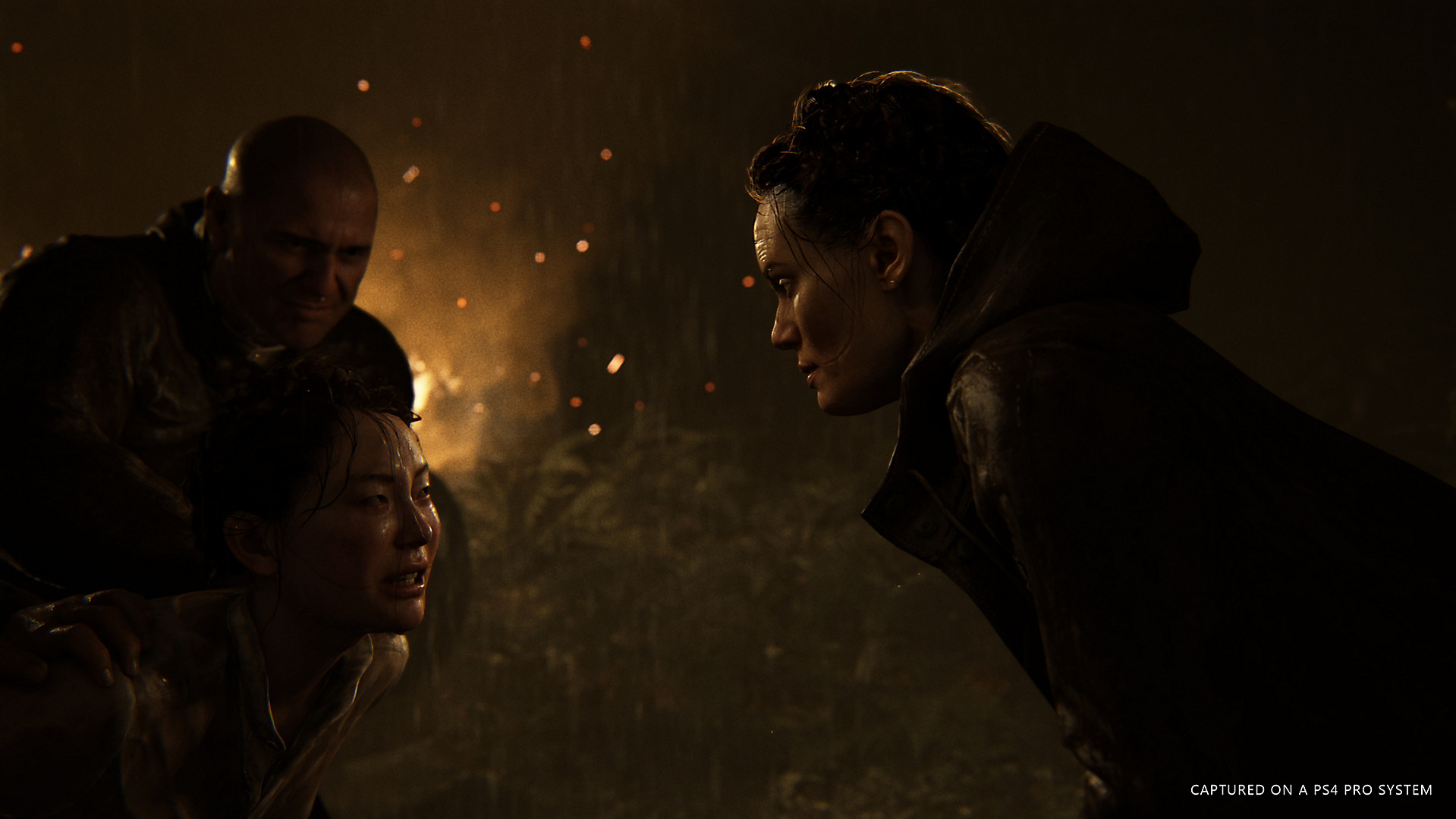Both Ian Alexander and Victoria Grace had never worked on a video game before, and neither had any prior experience with performance capture. However, in a recent interview with Polygon, both agreed that playing the Seraphite siblings in The Last of Us Part II was one of the most transformative experiences they ever had.
Alexander plays Lev, a former member of the in-game extremist religious sect called the Seraphites; he accompanies Abby throughout much of her journey. Alexander previously had live-action acting roles in Netflix’s original series The OA as Buck Vu and Vic in the 2018 film, Every Day.
Naughty Dog actually reached out to him directly — well, almost directly. At the time, Alexander didn’t have any representation, so Naughty Dog contacted The OA’s director, Zal Batmanlij, in order to ask him to pass on information about the role of Lev to Alexander and his mother. While he didn’t live in Los Angeles at the time, Alexander submitted a few self-taped auditions, and then he booked the role.
Alexander told Polygon that he spent the next three years working on The Last of Us Part II, during which time he felt incredibly supported and appreciated by the Naughty Dog team. “I remember feeling so special to have been selected for the role of Lev and having the opportunity to bring my own lived experience as a trans person to the table,” he said.
Grace, on the other hand, said that she was already familiar with The Last of Us and was well aware of the first game’s achievements and accolades within the video game industry. She played the role of Yara, the older sister of Lev. Her mother had actually found the opportunity through a job listing that contained a breakdown of Yara’s character.
At that time, The Last of Us Part II was described under a code name and the project was highly confidential. After sending an audition tape, Grace got invited to the motion capture stage for her callback. She met with Neil Druckmann and acted in a few scenes with Laura Bailey and Halley Gross.
:no_upscale()/cdn.vox-cdn.com/uploads/chorus_asset/file/21641818/104058031_937698060023575_6755073649447533609_n_1_.jpg 520w, https://cdn.vox-cdn.com/thumbor/1w07qLmALbbA8i_-xGMpSEDDj9g=/0x0:1080x1350/720x0/filters:focal(0x0:1080x1350):no_upscale()/cdn.vox-cdn.com/uploads/chorus_asset/file/21641818/104058031_937698060023575_6755073649447533609_n_1_.jpg 720w, https://cdn.vox-cdn.com/thumbor/wYc40b-hoplK-Q_gWfFa4hQg5eI=/0x0:1080x1350/920x0/filters:focal(0x0:1080x1350):no_upscale()/cdn.vox-cdn.com/uploads/chorus_asset/file/21641818/104058031_937698060023575_6755073649447533609_n_1_.jpg 920w, https://cdn.vox-cdn.com/thumbor/ufmqAXJWByG8GhB1l4WrnTGHKns=/0x0:1080x1350/1120x0/filters:focal(0x0:1080x1350):no_upscale()/cdn.vox-cdn.com/uploads/chorus_asset/file/21641818/104058031_937698060023575_6755073649447533609_n_1_.jpg 1120w, https://cdn.vox-cdn.com/thumbor/x_vGtktfwdcuTP8sM4ppeO3kI2c=/0x0:1080x1350/1320x0/filters:focal(0x0:1080x1350):no_upscale()/cdn.vox-cdn.com/uploads/chorus_asset/file/21641818/104058031_937698060023575_6755073649447533609_n_1_.jpg 1320w, https://cdn.vox-cdn.com/thumbor/zBYLvyQiCuXFl8yfIyP-Ew7gTrM=/0x0:1080x1350/1520x0/filters:focal(0x0:1080x1350):no_upscale()/cdn.vox-cdn.com/uploads/chorus_asset/file/21641818/104058031_937698060023575_6755073649447533609_n_1_.jpg 1520w, https://cdn.vox-cdn.com/thumbor/WZmCD052ufYYStefYQfSo6uvLtc=/0x0:1080x1350/1720x0/filters:focal(0x0:1080x1350):no_upscale()/cdn.vox-cdn.com/uploads/chorus_asset/file/21641818/104058031_937698060023575_6755073649447533609_n_1_.jpg 1720w, https://cdn.vox-cdn.com/thumbor/dsSuZXKlDFXq3MMraQ5GlndZ1d8=/0x0:1080x1350/1920x0/filters:focal(0x0:1080x1350):no_upscale()/cdn.vox-cdn.com/uploads/chorus_asset/file/21641818/104058031_937698060023575_6755073649447533609_n_1_.jpg 1920w)
Eventually Grace found out she had landed the role. She was especially happy, she said, because Yara’s description in the initial job posting had resonated so much with her: “I was immediately attached to Yara because of her strength, bravery, and selflessness.” Grace continued, “Her character breakdown described how she was willing to sacrifice everything she’s ever known for her younger brother. After reading it, I admired her and everything she stood for.”
Grace is the youngest of her five siblings. She noted that her views about family unconsciously carried over to her portrayal of Yara. Of course, Grace can’t relate to being an older sibling, much less living in a zombie apocalypse. However, she described how her close bonds with her own family allowed her to better understand the motivations behind Yara’s actions to protect Lev in The Last of Us Part II’s brutal world. “I would take a hammer to the arm for any of my siblings, and I know they’d do the same for me,” she says, referring to the graphic violence Yara endures during the scene in which the two siblings get introduced.
That very first scene introducing Lev and Yara was especially memorable for Grace; it’s quite the explosive entrance for both characters. Being thrown into an action sequence immediately was exhilarating, Grace recalled: “I got knocked down onto mats, I got to kill people with styrofoam hammers, and I got to scream my heart out! It was a blast!” When Grace wasn’t filming, she said that it was fascinating to watch behind-the-scenes as everyone else performed their parts. She would sometimes arrive early just to sit back and watch the other actors.
:no_upscale()/cdn.vox-cdn.com/uploads/chorus_asset/file/21566785/lev_and_yara.jpg 520w, https://cdn.vox-cdn.com/thumbor/ABR98W1PxVWRpoqGcd9E65fQMJQ=/0x0:1280x720/720x0/filters:focal(0x0:1280x720):no_upscale()/cdn.vox-cdn.com/uploads/chorus_asset/file/21566785/lev_and_yara.jpg 720w, https://cdn.vox-cdn.com/thumbor/cMcr6Yi-RnRbysA-V5EuqbE9Htk=/0x0:1280x720/920x0/filters:focal(0x0:1280x720):no_upscale()/cdn.vox-cdn.com/uploads/chorus_asset/file/21566785/lev_and_yara.jpg 920w, https://cdn.vox-cdn.com/thumbor/R4girjAxQEIho5QexQAYjGuYUu4=/0x0:1280x720/1120x0/filters:focal(0x0:1280x720):no_upscale()/cdn.vox-cdn.com/uploads/chorus_asset/file/21566785/lev_and_yara.jpg 1120w, https://cdn.vox-cdn.com/thumbor/rF023FSB5MhkZzY7b41BaHDXi54=/0x0:1280x720/1320x0/filters:focal(0x0:1280x720):no_upscale()/cdn.vox-cdn.com/uploads/chorus_asset/file/21566785/lev_and_yara.jpg 1320w, https://cdn.vox-cdn.com/thumbor/mAMl1tUVr32BZr_EYMildXprqeQ=/0x0:1280x720/1520x0/filters:focal(0x0:1280x720):no_upscale()/cdn.vox-cdn.com/uploads/chorus_asset/file/21566785/lev_and_yara.jpg 1520w, https://cdn.vox-cdn.com/thumbor/GU8-hk3zw7Ia5A7cm6ipv3lHZwM=/0x0:1280x720/1720x0/filters:focal(0x0:1280x720):no_upscale()/cdn.vox-cdn.com/uploads/chorus_asset/file/21566785/lev_and_yara.jpg 1720w, https://cdn.vox-cdn.com/thumbor/1QgCWaIDw6zl01YVcqD7xdsvXoc=/0x0:1280x720/1920x0/filters:focal(0x0:1280x720):no_upscale()/cdn.vox-cdn.com/uploads/chorus_asset/file/21566785/lev_and_yara.jpg 1920w)
A big turning point in both Grace and Alexander’s journeys was the PlayStation Experience 2017 event, or PSX. This was when both Yara and Lev were publicly introduced for the first time to fans. For Alexander in particular, he felt empowered by all the support that the community showed him during the event. A fan actually came out to Alexander as trans during a signing portion at the event, and told Alexander that they were so happy to see a character like Lev included in their favorite game franchise of all time.
“I remember seeing how their face lit up the moment that they saw the transgender symbol necklace I was wearing,” Alexander explained. “It makes me smile to be able to provide authentic transmasculine representation for other people like me.”
Alexander told me that his prior acting experiences playing trans characters prepared him to handle critique, as well as to be his own authentic self during his performances. His parents struggled to accept his gender identity, even as he took on roles in The OA and Every Day that put a spotlight on the trans experience. Alexander described how he was able to draw from his personal experiences when portraying Buck Vu and Vic, respectively. Portraying Lev was a much more rigorous adventure than his previous ones, he said: “Each role I’ve played has felt like an extension of myself, and so I definitely felt like Lev was the braver, post-apocalyptic version of myself.“
Lev’s storyline and portrayal as a trans character in The Last of Us Part II has inspired a lot of deep analysis, particularly around the way that Lev’s status as a trans person is revealed (the other Seraphites call Lev by his birth name). Waverly at Paste Magazine described Lev’s storyline as a trans narrative as told through a “cisgender voyeur” lens. Other critics, like frequent Polygon contributor Carolyn Petit, praised the game for portraying Lev as someone who “doesn’t hate himself” and who believes he deserves better.
Alexander told me that he completely understands where people are coming from in their criticism. Trans representation is still a new concept to a large number of executives in the entertainment industry. Alexander said that he feels providing full agency for trans characters to disclose their gender identities can make for powerful storylines, when told through a trans person’s perspective.
Alexander also explained that he felt like The Last of Us Part II accurately portrays his own personal experience dealing with transphobia in real life, as well as his own personal turmoil over the religion he grew up with, Mormonism, and his acceptance of his own gender identity.
“From my perspective as a transmasculine person who has faced transphobic discrimination as a result of religion and overall ignorance, it’s not uncommon for me to be misgendered by a stranger or by someone from my past,” he explained. He said that he personally did not feel triggered or retraumatized by the use of Lev’s birth name during the game. However, he also clarified that his experience is solely his own and that he cannot speak on behalf of every trans person.
There are some similarities, and also some differences, between Alexander’s and Lev’s life stories. Rather than abandoning what he was taught as a Seraphite, Lev decided to use his faith to comfort him through hardship. In the game, he tells Abby that the Seraphites have misinterpreted the words of the prophet that were supposed to be about peace and unity, and they have instead chosen violence and hatred.



Alexander told me he did the complete opposite of what Lev did. In order to cope and heal from the discrimination he faced from his own family, he chose to disconnect from his own faith. Even so, he elaborated that he believes that Lev’s own principles are what actually drives his actions, with his religion being the motivation for his empathy.
Although they took different paths, this is where Alexander said he could really see himself in Lev. “Even when his faith is used against him by other Seraphites or Abby, he still holds onto his moral compass to guide him … We both just want to be true to ourselves, do the morally right thing, and to protect the ones we love.“
He also told me that the racial diversity represented in The Last of Us Part II meant a lot to him. Lev and Yara are Asian American, but their racial identities don’t really have anything to do with their own character arcs. For Alexander, he said that it’s refreshing to see Asian, Latinx, and Black characters just simply exist in the game’s world and not have to be defined by their own racial identities.
Grace agreed, noting that when it comes to characters of color, it is common for the story to place an emphasis on their backgrounds. She said that she felt like The Last of Us Part II provided a truer picture of representation, one that reflects the real world.
“If someone asked me which characteristics I would use to describe Yara and Lev, ‘being Asian’ wouldn’t be my first thought, because Neil and Halley are so great at developing three-dimensional characters,” Grace said.
:no_upscale()/cdn.vox-cdn.com/uploads/chorus_asset/file/21647121/103077236_2651897085095583_8961671749731679375_n.jpg 520w, https://cdn.vox-cdn.com/thumbor/P5GpzOx4rAGNV2jH0m3Cbox3i0E=/0x0:640x640/720x0/filters:focal(0x0:640x640):no_upscale()/cdn.vox-cdn.com/uploads/chorus_asset/file/21647121/103077236_2651897085095583_8961671749731679375_n.jpg 720w, https://cdn.vox-cdn.com/thumbor/wGNoOuMFiI_tOVB-iUVAKw3wK2A=/0x0:640x640/920x0/filters:focal(0x0:640x640):no_upscale()/cdn.vox-cdn.com/uploads/chorus_asset/file/21647121/103077236_2651897085095583_8961671749731679375_n.jpg 920w, https://cdn.vox-cdn.com/thumbor/7lA30pDkOmrBasruqblR1VuNy-4=/0x0:640x640/1120x0/filters:focal(0x0:640x640):no_upscale()/cdn.vox-cdn.com/uploads/chorus_asset/file/21647121/103077236_2651897085095583_8961671749731679375_n.jpg 1120w, https://cdn.vox-cdn.com/thumbor/2_S4h4HGMUlkAbP8XJUAeNiyeZ4=/0x0:640x640/1320x0/filters:focal(0x0:640x640):no_upscale()/cdn.vox-cdn.com/uploads/chorus_asset/file/21647121/103077236_2651897085095583_8961671749731679375_n.jpg 1320w, https://cdn.vox-cdn.com/thumbor/NrpJ71uZ2UrrGJkdrkeuE7IoJ4s=/0x0:640x640/1520x0/filters:focal(0x0:640x640):no_upscale()/cdn.vox-cdn.com/uploads/chorus_asset/file/21647121/103077236_2651897085095583_8961671749731679375_n.jpg 1520w, https://cdn.vox-cdn.com/thumbor/Qr9sb98WadSiaJ3c-rSm9dzLo-U=/0x0:640x640/1720x0/filters:focal(0x0:640x640):no_upscale()/cdn.vox-cdn.com/uploads/chorus_asset/file/21647121/103077236_2651897085095583_8961671749731679375_n.jpg 1720w, https://cdn.vox-cdn.com/thumbor/REB_2vNoKNst24-4-0RGudCLoHI=/0x0:640x640/1920x0/filters:focal(0x0:640x640):no_upscale()/cdn.vox-cdn.com/uploads/chorus_asset/file/21647121/103077236_2651897085095583_8961671749731679375_n.jpg 1920w) Image: Victoria Grace
Image: Victoria Grace
Both actors believe that being involved in this game will open the door for more opportunities for themselves in other realms of the entertainment industry. Alexander acknowledged that he has absolutely seen a difference in the industry in the last few years, especially now that trans people are more visible than ever.
Alexander also emphasized the importance of trans people being involved in every step of the production process, both in front of the camera and behind it. “I’m also really eager to see how the industry will uplift Black and Indigenous trans voices, who have been ignored and silenced for far too long.”
Grace is grateful that Druckmann took a chance on her to be a part of Naughty Dog’s latest story. “As far as representation goes, I’m hoping that Part II will inspire other creators and writers to push for more inclusive stories. Not only in video games, but in the media as a whole.”
Hopefully, having played such important characters in Part II will lead to more roles in future video games for Alexander and Grace, too. Since Grace had such a fun time on set, one of her new goals is to participate in more performance motion capture roles.
At Grace’s call back, Druckmann asked her if she played video games. Although she was familiar with The Last of Us, she replied honestly by saying “No, I’m not really allowed … ” and he laughed, nodding his head in understanding. “That wasn’t a very smart thing to say, from a business perspective, but what was done was done,” she recalled with a smile.
As a result of working with Naughty Dog, she has started playing more video games and absolutely loves them. “I would now call myself a gamer, albeit not a very good one, but I’m getting there. It’s thanks to Naughty Dog and Part II.”
Source: Read Full Article